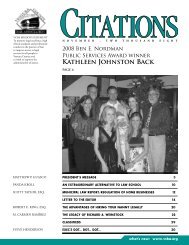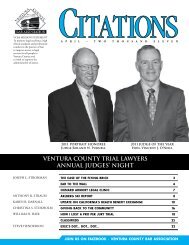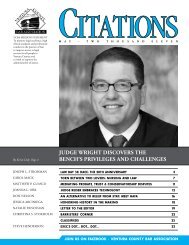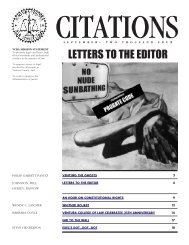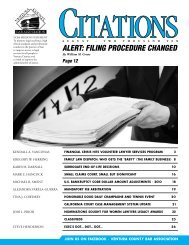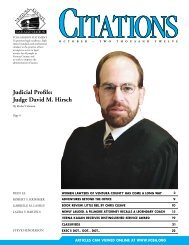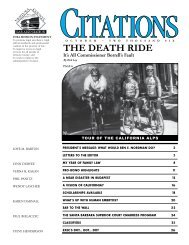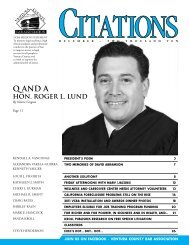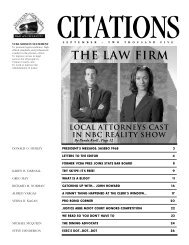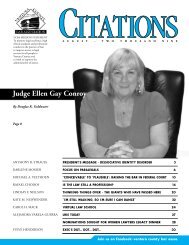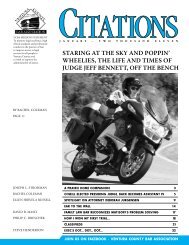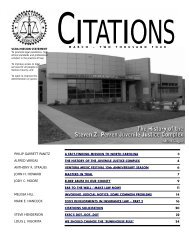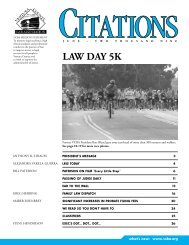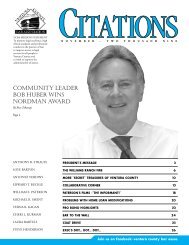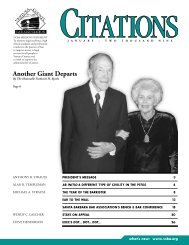Everyone likes a story. Especially if the story - Ventura County Bar ...
Everyone likes a story. Especially if the story - Ventura County Bar ...
Everyone likes a story. Especially if the story - Ventura County Bar ...
You also want an ePaper? Increase the reach of your titles
YUMPU automatically turns print PDFs into web optimized ePapers that Google loves.
I was talking with Bob Krimmer at Kendall<br />
Van Conas’ birthday party. Bob, who works<br />
with Kendall at A to Z, was a successful actor<br />
before practicing law (“One L<strong>if</strong>e to Live”). He<br />
started law school before leaving to embark<br />
on his acting career (Bob eventually earned<br />
his law degree at <strong>Ventura</strong> College of Law).<br />
To my great delight, I discovered that he was<br />
at Hastings not long after I was, and that<br />
we had at least three first-year professors in<br />
common. Don Hurley and I, who were in<br />
<strong>the</strong> same section at Hastings, stopped talking<br />
about law school 25 years ago. But Bob was<br />
talking about his great professors and we<br />
began comparing stories about Professors<br />
Crawford, who taught contracts, Smith,<br />
who taught us nothing about torts, and <strong>the</strong><br />
great guy we had for civ pro whose name we<br />
couldn’t recall. It was on my second glass of<br />
Pinot Noir that I remembered his name in a<br />
flashback to one particular day.<br />
Professor Milton Green, who was a member<br />
of <strong>the</strong> famed “65 Club,” was our instructor.<br />
The day I recalled was when he spent one<br />
entire class session telling <strong>the</strong> <strong>story</strong> of Chief<br />
Justice David S. Terry, Terry’s romance with<br />
Sarah Al<strong>the</strong>a Hill, and Terry’s l<strong>if</strong>elong enmity<br />
with U.S. Supreme Court Justice Stephen J.<br />
Field that ended with Terry’s violent death.<br />
To boot, <strong>the</strong> case that it spawned resulted in<br />
a Supreme Court decision of over 90 pages<br />
that established <strong>the</strong> bounds of state vs. federal<br />
jurisdiction. Until that conversation with Bob<br />
and <strong>the</strong> second glass of Pinot, I had forgotten<br />
how much fun law school really was! I had<br />
to hear <strong>the</strong> <strong>story</strong> again.<br />
David Terry, a lawyer from Texas, came to<br />
Cal<strong>if</strong>ornia in 1849 stricken by gold fever. He<br />
found his gold, however, in <strong>the</strong> practice of law.<br />
He was a dashing and flamboyant advocate<br />
who was known to duel as readily as argue<br />
and to carry a bowie kn<strong>if</strong>e under his vest in<br />
court. His success was evident. Within eight<br />
years he was Chief Justice of Cal<strong>if</strong>ornia. At<br />
34, his future was set – or at least one would<br />
have thought.<br />
In 1857, <strong>the</strong> debate over states’ rights and<br />
PRESIDENT’S MESSAGE<br />
By Tony Strauss<br />
slavery had made its way to Cal<strong>if</strong>ornia. Terry,<br />
a Sou<strong>the</strong>rner, had views consistent with<br />
his heritage and didn’t hesitate to express<br />
his opinions. Holding a contrary position<br />
was David Broderick, a U.S. Senator from<br />
Cal<strong>if</strong>ornia. Broderick criticized Terry’s<br />
stance on state’s rights issues. Determined to<br />
settle <strong>the</strong> matter according to his code, Terry<br />
resigned his position as Chief Justice and<br />
challenged <strong>the</strong> Senator to a duel. At dawn<br />
on September 12, 1859, <strong>the</strong> affair was settled<br />
when Terry shot and killed Broderick on <strong>the</strong><br />
dunes near Lake Merced, on <strong>the</strong> outskirts of<br />
San Francisco. The San Francisco Vigilante<br />
Committee responded by trying to lynch him.<br />
Wisely, Terry went back to Texas, where he<br />
became a brigadier general in <strong>the</strong> Confederate<br />
Army.<br />
Stephen J. Field also came to Cal<strong>if</strong>ornia in<br />
1849 allured by <strong>the</strong> glint of gold. He had<br />
been admitted to <strong>the</strong> Massachusetts bar in<br />
1841 and when he settled in Marysville, he<br />
set up practice. Within a year he was elected<br />
Alcalde, a position equivalent to mayor, and<br />
was <strong>the</strong>n elected to <strong>the</strong> Cal<strong>if</strong>ornia Legislature.<br />
He too was flamboyant, twice being disbarred<br />
and once sent to jail for contempt of court.<br />
None<strong>the</strong>less, in spite of losing a bid for <strong>the</strong><br />
state Senate in 1851, and after amassing a<br />
vast wealth from <strong>the</strong> noble practice, he was<br />
elected to <strong>the</strong> state Supreme Court in 1857<br />
as a free soil, anti-slavery Democrat. David<br />
Terry administered his oath of office.<br />
Field was close friends with Broderick. In<br />
fact, when Field was involved in a barroom<br />
dispute that resulted in <strong>the</strong> challenge of a<br />
duel, Broderick agreed to be Field’s second.<br />
Fortunately, <strong>the</strong> duel was not consummated.<br />
Understandably, when Terry shot Broderick,<br />
Field was not sympa<strong>the</strong>tic to <strong>the</strong> victor.<br />
In 1863, when Congress authorized a tenth<br />
seat on <strong>the</strong> United States Supreme Court,<br />
Abraham Lincoln appointed Stephen Field<br />
to <strong>the</strong> High Court, where he was to serve<br />
longer than any o<strong>the</strong>r Justice until William<br />
O. Douglas. Of course, in <strong>the</strong> 19th century,<br />
an appointment to <strong>the</strong> Supreme Court did<br />
not necessarily mean <strong>the</strong> end of politics. Field<br />
was interested in <strong>the</strong> Democratic nomination<br />
for President in 1880 and 1884. However, an<br />
old nemesis got in <strong>the</strong> way. David Terry had<br />
returned to Cal<strong>if</strong>ornia, resumed <strong>the</strong> practice<br />
of law and established enough clout with<br />
APRIL 2009 • CITATIONS 3<br />
Cal<strong>if</strong>ornia Democrats to block this state’s<br />
endorsement. The drama continued.<br />
Sarah Al<strong>the</strong>a Hill was a young, beaut<strong>if</strong>ul<br />
courtesan of San Francisco high society.<br />
Among her paramours was William Sharon, a<br />
former Senator from Nevada, multimillionaire<br />
from <strong>the</strong> Comstock Lode, and owner of <strong>the</strong><br />
Palace and Grand Hotels. It was in <strong>the</strong> former<br />
that Sharon built a residence in a suite of rooms<br />
that connected by a bridge over an adjoining<br />
street to <strong>the</strong> residence of his mistress, Miss<br />
Hill. The laws of marriage being somewhat<br />
looser than today, Hill claimed that Sharon<br />
had entered into a marriage contract and,<br />
when <strong>the</strong> bliss was gone, she demanded half of<br />
his property. Sharon sued her in federal court<br />
to null<strong>if</strong>y <strong>the</strong> purported marriage and to have<br />
<strong>the</strong> “contract’ returned to him. Hill hired<br />
Terry to represent her. The trial was carried<br />
by <strong>the</strong> press and its details were reported like<br />
a celebrity divorce today.<br />
Hill apparently filed her own case in state<br />
court, as <strong>the</strong> Superior Court granted Hill a<br />
“divorce” on Christmas Eve 1884, awarding<br />
her half of Sharon’s property, $2,500 a month<br />
in alimony and $55,000 in attorney’s fees.<br />
Terry’s w<strong>if</strong>e died that same day.<br />
Meanwhile, Sharon died in 1885. Terry<br />
married Hill and <strong>the</strong> Federal Court ruled in<br />
January 1886 that <strong>the</strong> Sharon-Hill marriage<br />
document was a forgery. Hill was ordered to<br />
surrender <strong>the</strong> document, but she refused.<br />
In days of old, Supreme Court Justices had<br />
to “ride circuit.” In o<strong>the</strong>r words, <strong>the</strong>y had to<br />
return to <strong>the</strong>ir circuit and hear cases, typically<br />
once every two years. Even though he was <strong>the</strong><br />
<strong>the</strong>n senior member of <strong>the</strong> Court, Justice Field<br />
was subject to <strong>the</strong> same requirement. Because<br />
Hill had not surrendered <strong>the</strong> questionable<br />
document as demanded by <strong>the</strong> federal court,<br />
she was ordered to re-appear. The matter was<br />
heard in March 1888 before a three-judge<br />
panel presided over by, guess who … Stephen<br />
Field. When Field ordered Hill to deliver up<br />
<strong>the</strong> document, she refused and proceeded<br />
to tongue-lash his Honor, claiming he was<br />
vindictive and politically corrupt.<br />
Justice Field did not appreciate Hill’s outburst<br />
and ordered her removed. This prompted<br />
continued on page 7



